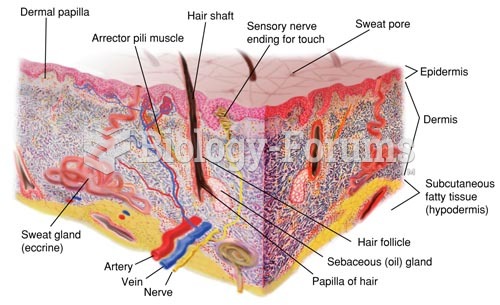Answer to Question 1
1
Rationale:
1. Thin skin and less subcutaneous fat cause the infant to have an increased absorption of harmful chemical substances and topical medications. Doses will need to be adjusted accordingly.
2. Thin skin and less subcutaneous fat cause the infant to have an increased absorption of harmful chemical substances and topical medications. Doses will need to be adjusted accordingly.
3. Thin skin and less subcutaneous fat cause the infant to become easily chilled, to lose heat rapidly, and to have difficulty regulating body temperature. They have an increased absorption of harmful chemical substances and topical medications.
4. Thin skin and less subcutaneous fat cause the infant to become easily chilled, to lose heat rapidly, and to have difficulty regulating body temperature. They have an increased absorption of harmful chemical substances and topical medications.
Answer to Question 2
1, 2, 3, 4
Rationale:
1. Vernix caseosa is composed of shed cells, serving to cover and protect the fetus from amniotic fluid and urine. Vernix caseosa has properties of anti-infection, anti-oxidants, and moisturizer, and includes wound-healing agents.
2. Vernix caseosa is composed of shed cells, serving to cover and protect the fetus from amniotic fluid and urine. Vernix caseosa has properties of anti-infection, anti-oxidants, and moisturizer, and includes wound-healing agents.
3. Vernix caseosa is composed of shed cells, serving to cover and protect the fetus from amniotic fluid and urine. Vernix caseosa has properties of anti-infection, anti-oxidants, and moisturizer, and includes wound-healing agents.
4. Vernix caseosa is composed of shed cells, serving to cover and protect the fetus from amniotic fluid and urine. Vernix caseosa has properties of anti-infection, anti-oxidants, and moisturizer, and includes wound-healing agents.
5. Vernix caseosa is composed of shed cells, serving to cover and protect the fetus from amniotic fluid and urine. Vernix caseosa has properties of anti-infection, anti-oxidants, and moisturizer, and includes wound-healing agents. It does not have anti-diarrheal properties.
6. Vernix caseosa is composed of shed cells, serving to cover and protect the fetus from amniotic fluid and urine. Vernix caseosa has properties of anti-infection, anti-oxidants, and moisturizer, and includes wound-healing agents. It does not toughen skin.







